MABF2790
Anti-CD96 Antibody, clone 6A6
About This Item
Produits recommandés
Source biologique
rat
Niveau de qualité
Conjugué
unconjugated
Forme d'anticorps
purified antibody
Type de produit anticorps
primary antibodies
Clone
6A6, monoclonal
Poids mol.
calculated mol wt 67.13 kDa
Produit purifié par
using protein G
Espèces réactives
mouse
Conditionnement
antibody small pack of 100 μg
Technique(s)
ELISA: suitable
blocking: suitable
flow cytometry: suitable
inhibition assay: suitable
Isotype
IgG2a
Séquence de l'épitope
N-terminal
Numéro d'accès Protein ID
Numéro d'accès UniProt
Conditions d'expédition
dry ice
Modification post-traductionnelle de la cible
unmodified
Informations sur le gène
mouse ... Cd96(84544)
Description générale
Spécificité
Immunogène
Application
Evaluated by Flow Cytometry in EL4 cells.
Flow Cytometry Analysis: 1 μg of this antibody detected CD96 in one million EL4 cells.
Tested Applications
Flow Cytometry Analysis: A representative lot detected CD96 in Flow Cytometry applications (Seth, S., et al. (2007). Biochem Biophys Res Commun. 364(4):959-65; Aguilera, A.R., et al. (2018). Oncoimmunology. 7(5):e1424677; Chiang, E.Y., et al. (2020). Eur J Immunol. 50(6):891-902).
ELISA Analysis: A representative lot detected CD96 in ELISA applications (Aguilera, A.R., et al. (2018). Oncoimmunology. 7(5):e1424677) .
Inhibition Assay: A representative lot of this antibody blocked CD96-CD155 interaction. (Seth, S., et al. (2007). Biochem Biophys Res Commun. 364(4):959-65; Aguilera, A.R., et al. (2018). Oncoimmunology. 7(5):e1424677; Georgiev, H., et al. (2018). Front Immunol. 9:1072).
Note: Actual optimal working dilutions must be determined by end user as specimens, and experimental conditions may vary with the end user
Forme physique
Stockage et stabilité
Autres remarques
Clause de non-responsabilité
Vous ne trouvez pas le bon produit ?
Essayez notre Outil de sélection de produits.
Code de la classe de stockage
12 - Non Combustible Liquids
Classe de danger pour l'eau (WGK)
WGK 2
Certificats d'analyse (COA)
Recherchez un Certificats d'analyse (COA) en saisissant le numéro de lot du produit. Les numéros de lot figurent sur l'étiquette du produit après les mots "Lot" ou "Batch".
Déjà en possession de ce produit ?
Retrouvez la documentation relative aux produits que vous avez récemment achetés dans la Bibliothèque de documents.
Notre équipe de scientifiques dispose d'une expérience dans tous les secteurs de la recherche, notamment en sciences de la vie, science des matériaux, synthèse chimique, chromatographie, analyse et dans de nombreux autres domaines..
Contacter notre Service technique







